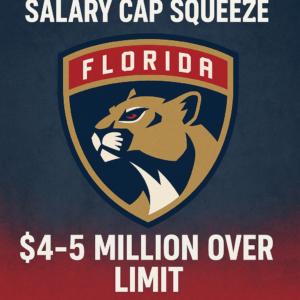Florida Panthers Face Salary Cap Squeeze: $4-5 Million Over Limit Ahead of 2025-26 Season
The Florida Panthers, fresh off a strong run in recent seasons, find themselves in a precarious financial position as they head into the 2025-26 NHL campaign. Reports indicate that the team is currently $4-5 million over the league’s salary cap, forcing management into a corner as they navigate a complex offseason filled with difficult roster decisions. With a roster built for contention, the pressure is on to maintain key pieces without sacrificing depth or future flexibility.

General Manager Bill Zito and his front office are now tasked with finding ways to shed salary without compromising the team’s competitive edge. Buyouts, trades, or the potential departure of unrestricted free agents are all on the table. Several players with sizable contracts are drawing attention, including veteran contributors whose cap hits may now outweigh their on-ice value. The team’s success has come at a cost, and the front office must now balance immediate success with long-term sustainability.
One of the primary challenges lies in retaining the team’s young core while addressing inflated contracts handed out in previous seasons. Rising stars such as Anton Lundell and Spencer Knight are due for contract extensions, and their future salaries must be accounted for in a tightened cap scenario. At the same time, aging veterans with diminishing returns present opportunities for potential cap relief through trades or buyouts, though such moves could also damage locker room chemistry or fan morale.

The Panthers also face intense scrutiny from fans and analysts who recognize the fragility of a championship window. After making deep playoff runs and raising expectations across the league, any major roster shake-up could jeopardize the team’s momentum. However, standing pat is not an option with the salary cap looming large. A failure to act decisively could lead to penalties or forced adjustments from the league.
Compounding the issue is the unpredictability of the NHL’s salary cap ceiling, which has risen only modestly in recent years. While hopes for a more significant increase persist, the Panthers must operate under the current constraints. This means that even minor contract additions—whether from rookies or free-agent signings—must be weighed with financial precision. Every dollar counts, and every decision will be scrutinized in the coming weeks.

Ultimately, the Panthers’ offseason will be defined not just by who they sign or trade, but by how creatively and efficiently they navigate a salary cap that threatens to undo years of careful roster building. With the eyes of the league on Sunrise, Florida, the Panthers are entering one of the most pivotal financial offseasons in their franchise history. Whether they emerge as cap-savvy contenders or see their core fractured will depend heavily on the moves made in the coming days.